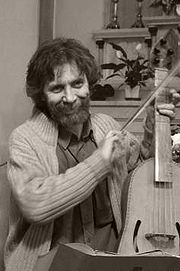
Alexandre Danilevsky
Encyclopedia

Composer
A composer is a person who creates music, either by musical notation or oral tradition, for interpretation and performance, or through direct manipulation of sonic material through electronic media...
of classical music
Classical music
Classical music is the art music produced in, or rooted in, the traditions of Western liturgical and secular music, encompassing a broad period from roughly the 11th century to present times...
, lutenist, viola da gamba and vielle
Vielle
The vielle is a European bowed stringed instrument used in the Medieval period, similar to a modern violin but with a somewhat longer and deeper body, five gut strings, and a leaf-shaped pegbox with frontal tuning pegs. The instrument was also known as a fidel or a viuola, although the French...
player, active in France
France
The French Republic , The French Republic , The French Republic , (commonly known as France , is a unitary semi-presidential republic in Western Europe with several overseas territories and islands located on other continents and in the Indian, Pacific, and Atlantic oceans. Metropolitan France...
(Metz
Metz
Metz is a city in the northeast of France located at the confluence of the Moselle and the Seille rivers.Metz is the capital of the Lorraine region and prefecture of the Moselle department. Located near the tripoint along the junction of France, Germany, and Luxembourg, Metz forms a central place...
(Lotharingia
Lotharingia
Lotharingia was a region in northwest Europe, comprising the Low Countries, the western Rhineland, the lands today on the border between France and Germany, and what is now western Switzerland. It was born of the tripartite division in 855, of the kingdom of Middle Francia, itself formed of the...
)).
He is the artistic director of the Early Music ensemble "Syntagma 7", noted in particular for interpretations of music by the trouvere
Trouvère
Trouvère , sometimes spelled trouveur , is the Northern French form of the word trobador . It refers to poet-composers who were roughly contemporary with and influenced by the troubadours but who composed their works in the northern dialects of France...
Gautier d'Epinal, as well as Russian and Ukrainian Baroque
Baroque
The Baroque is a period and the style that used exaggerated motion and clear, easily interpreted detail to produce drama, tension, exuberance, and grandeur in sculpture, painting, literature, dance, and music...
composers.
Piano solo
- Sonata N° 2 (1987) Sonata-Reminiscenza: In Memoriam Nikolai Medtner
- Sonata "1985. In Memoriam Charles Ives"
- Le Retour
- Piano Suite in g
- Raining on Kopenhagen;
- Sonates I and II;
- Night Music;
- Concerto for two pianos
Other instruments
- Sonata I for violin and piano;
- "Revelation" for cello solo ed. by "HH-Musikverlag": AD001
- Three Inventions for three melodic instruments
- Ricercars (7 pieces for recorder or flute solo - in print now: Edition Tre Fontane);
- "Tombeau de Messiaen" for organ, commissioned for the festival "La Route des Orgues";
- Dolce Suono for two recorders - ed. by TRE FONTANE: ETF 2038
- "Antiphones - I" (1997 - in print TRE FONTANE) and II
- Senza Titolo
- Organum for string orchestra;
- String Quartets I to X
For voice and instrumental ensemble
- "Lauda", 1996 with Rebecca BAIN, soprano and an ensemble of early instruments.
- "Seven Words of Christ"
- Pietа for soprano and string quartet, recorder and organ ad libitum;
Recordings
- "Johannes Ciconia and his time" Melodia 1998
- "Russian Baroque Music" Pierre Vérany, 2002
- "Touz esforciez /Trouvères en Lorraine", Pierre Vérany, 2004
- "Gautier d'Epinal/Remembrance", Challenge,2008
- "Mille Merçede" (music from TrecentoTrecentoThe Trecento refers to the 14th century in Italian cultural history.Commonly the Trecento is considered to be the beginning of the Renaissance in art history...
) Challenge, 2008

